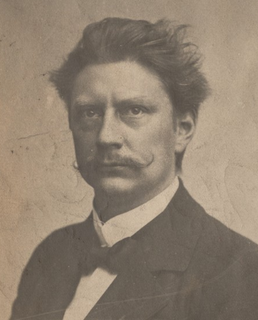Related Research Articles

Symphony No. 9 in D minor is the last symphony on which Anton Bruckner worked, leaving the last movement incomplete at the time of his death in 1896; Bruckner dedicated it "to the beloved God". The symphony was premiered under Ferdinand Löwe in Vienna in 1903.
Friedrich Blume was professor of musicology at the University of Kiel from 1938–1958. He was a student in Munich, Berlin and Leipzig, and taught in the last two of these for some years before being called to the chair in Kiel. His early studies were on Lutheran church music, including several books on J.S. Bach, but broadened his interests considerably later. Among his prominent works were chief editor of the collected Praetorious edition, and he also edited the important Eulenburg scores of the major Mozart Piano Concertos. From 1949 he was involved in the planning and writing of Die Musik in Geschichte und Gegenwart. Coincidentally he died within a few weeks of another prominent Mozart musicologist, Cuthbert Girdlestone, and was thus almost his exact contemporary.
Werner F. Korte (1906–1982) was a German musicologist who in 1932 was appointed head of the Seminar of Musicology at the University of Münster. His books include Die Harmonik des frühen XV. Jahrhunderts in ihrem Zusammenhang mit der Formtechnik (1929), Studie zur Geschichte der Musik in Italien im ersten Viertel des 15. Jahrhunderts (1933), Robert Schumann (1937), and Bruckner und Brahms (1963), among others.

Tilo Medek, originally Müller-Medek, was a German classical composer, musicologist and music publisher. He grew up in East Germany, but was inspired by the Darmstädter Ferienkurse. He composed radio plays and incidental music. His setting of Lenin's Decree on Peace led to restrictions, and after he showed solidarity with the expatriated Wolf Biermann, he also had to move to the West, where he composed an opera Katharina Blum based on Heinrich Böll's novel, and worked in education. He received international awards from 1967 on.
Stefan Kunze was a German musicologist.

Fritz Volbach was a German conductor, composer and musicologist.
Christoph-Hellmut Mahling was a German musicologist and lecturer at various universities.
Egon Voss is a German musicologist, who is particularly known for his contributions to Richard Wagner research.
Klaus Hortschansky was a German musicologist.
Joseph Maria Müller-Blattau was a German musicologist and National Socialist cultural official. He is regarded as a "nestor of Saarbrücken musicology" but also as a "singer of a musical seizure of power" because of his activities in National Socialism.
Uwe Harten is a German musicologist, who works in Austria.
Rainer Cadenbach was a German musicologist and University professor.
Ulrich Aloysius Konrad is a German musicologist and professor at the Institute for Music Research of the University of Würzburg. He is considered an expert on European music of the 17th to 20th centuries, especially the works of Wolfgang Amadeus Mozart, Robert Schumann, Richard Wagner and Richard Strauss.
Albrecht Riethmüller is a German musicologist.
The Archiv für Musikwissenschaft is a quarterly German-English-speaking trade magazine devoted to music history and historical musicology, which publishes articles by well-known academics and young scholars.
Thomas Phleps was a German guitarist and musicologist.
Christoph von Blumröder is a German musicologist.
Birgit Lodes is a German musicologist and lecturer at the University of Vienna.
Theophil Antonicek was an Austrian musicologist.
Hermann Danuser is a Swiss-German musicologist.
References
- ↑ member entry of Wolfram Steinbeck at the Akademie der Wissenschaften und der Literatur Mainz
- ↑ Das Menuett in der Instrumentalmusik Joseph Haydns on WorldCat
- ↑ Struktur und Ähnlichkeit. Methoden automatisierter Melodienanalyse on WorldCat
- ↑ Anton Bruckner. Neunte Sinfonie on WorldCat
- ↑ Die Symphonie im 19. und 20. Jahrhunderts on Google Books